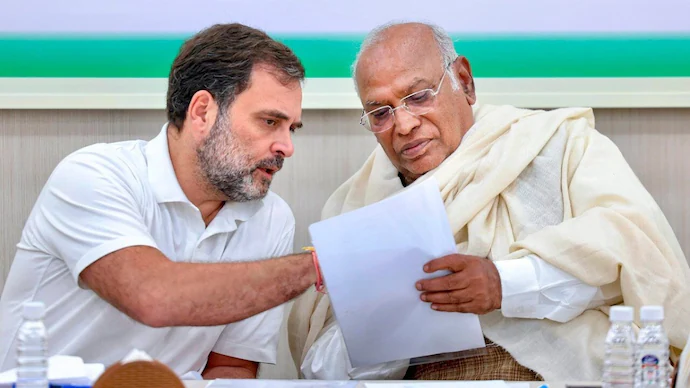The Indian National Congress, through a strong and clearly worded dissent note, has tabled its objection to the manner and method of the appointment of the Chairperson of the NHRC recently. On the selection process, the letter of INC President Mallikarjun Kharge and Leader of the Opposition (LOP) Rahul Gandhi states that “the selection process adopted by the Committee was fundamentally flawed. It was a pre-determined exercise that ignored the established tradition of mutual consultation and consensus, which is essential in such matters. This departure undermines the principles of fairness and impartiality, which are critical to the credibility of the Selection Committee. Instead of fostering deliberation and ensuring a collective decision, the Committee relied on its numerical majority to finalize the names.”
The Indian National Congress had proposed the names of Justice Rohinton Fali Nariman and Justice Kuttiyil Mathew Joseph for Chairperson and recommended the names of Justice S. Muralidhar and Justice Akil Abdulhamid Qureshi as Members of the NHRC stating that, both of whom have exemplary track records in upholding human rights. However, states the Dissent Note, “the dismissive approach adopted by the majority of the Selection Committee in today’s meeting towards these considerations is deeply regrettable.”
The dissent note dated December 18, 2024 has been made public. It outlines in detail the points of order.
Dissent Note
The meeting of the Selection Committee for selection of Chairperson and Members of the National Human Rights Commission (NHRC) was held at 1.00 PM on 18 December 2024 at G54, Parliament House.
Without prejudice to the names of the Chairperson and members approved by the Selection Committee, we respectfully record our dissent on the following grounds:
Firstly, the selection process adopted by the Committee was fundamentally flawed. It was a pre-determined exercise that ignored the established tradition of mutual consultation and consensus, which is essential in such matters. This departure undermines the principles of fairness and impartiality, which are critical to the credibility of the Selection Committee. Instead of fostering deliberation and ensuring a collective decision, the Committee relied on its numerical majority to finalize the names, disregarding the legitimate concerns and perspectives raised during the meeting.
Secondly, the National Human Rights Commission (NHRC) is a vital statutory body tasked with safeguarding the fundamental human rights of all citizens, particularly those from oppressed and marginalized sections of society. Its ability to fulfil this mandate depends significantly on the inclusiveness and representativeness of its composition. A diverse leadership ensures that the NHRC remains sensitive to the unique challenges faced by various communities, especially those most vulnerable to human rights violations.
We proposed the names of Justice Rohinton Fali Nariman and Justice Kuttiyil Mathew Joseph for the position of Chairperson, keeping in mind both merit and the need for inclusivity. Justice Rohinton Fali Nariman, a distinguished jurist from the minority Parsi community, is renowned for his intellectual depth and unwavering commitment to constitutional values. His inclusion would send a strong message about the NHRC’s dedication to representing India’s pluralistic society. Similarly, Justice Kuttiyil Mathew Joseph, a former Supreme Court judge, belonging to minority Christian community, has consistently delivered judgments that emphasize individual freedoms and the protection of marginalized groups, making him an ideal candidate for this critical position.
Furthermore, for the position of Members, we recommended the names of Justice S. Muralidhar and Justice Akil Abdulhamid Qureshi, both of whom have exemplary track records in upholding human rights. Justice S. Muralidhar is widely respected for his landmark judgments advancing social justice, including his work on custodial violence and the protection of civil liberties. Justice Akil Abdulhamid Qureshi, belonging to the Muslim minority community, has consistently defended constitutional principles and demonstrated a strong commitment to accountability in governance. Their inclusion would contribute to the NHRC’s effectiveness and its commitment to diversity.
Thirdly, while merit is undeniably the primary criterion, maintaining a balance that reflects the regional, caste, community, and religious diversity of the nation is equally important. This balance ensures that the NHRC operates with an inclusive perspective, sensitive to the lived experiences of all sections of society. By neglecting this critical principle, the Committee risks eroding public trust in this esteemed institution.
Lastly, the dismissive approach adopted by the majority of the Selection Committee in today’s meeting towards these considerations is deeply regrettable. The NHRC’s credibility and effectiveness depend on its ability to embody the diversity and inclusiveness that define India’s constitutional ethos. The names we proposed reflect this spirit and align with the foundational principles of the Commission. Their exclusion raises significant concerns about the impartiality and fairness of the selection process.
The Dissent Note May be viewed here.
Related:
Uttar Pradesh has highest number of cases “closed by the NHRC without reason”: NHRC data
